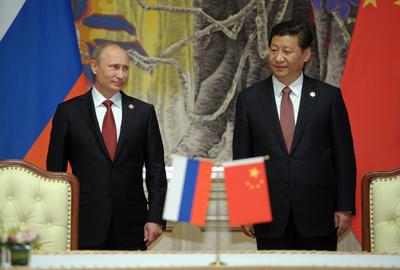Recently, China Natural Petroleum Corporation and Gazprom signed a deal that will see a new pipeline built linking Siberia’s Chayandinskoye oil and gas field to China. 38 billion cubic metres of gas will be exported annually from 2018–48. Gazprom CEO Alexei Miller boasted that the deal is worth about US$400 billion — giving a unit price somewhere around US$350 per 1000 cubic metres. Price has been the main sticking point in bilateral energy deals. This is at the low end of European pricing (up to US$450), more expensive than China’s imports from Turkmenistan and certainly less than Russia — in a weak negotiating position following the Ukraine crisis — would have liked.
The deal still makes sense for both sides. China currently relies heavily on imports of fossil fuels and suffers permanent neuralgia at its vulnerability, with 90 per cent of oil imports coming in on ships that pass through the Malacca Strait. Heavy reliance on coal (around 80 per cent of electricity generation) exacerbates severe air pollution and the Chinese leadership has resolved to tackle this socially disruptive problem.
China has been working on plenty of other options, including building its own pipeline across Central Asia and plans for shale gas extraction, while Russia has plenty of energy to sell but not much else. With EU sanctions extended again, Russia’s main European customers are at best uncomfortable with where they are shopping, so new customers are welcome. Eurostat reports that 77 per cent of Russia’s exports to Europe are oil and gas.
But there is more to this ‘strategic partnership’ than the economics of energy. In a highly active diplomatic program, the relationship with Russia seems to be at the top of Xi Jinping’s agenda. Symbolically, Moscow was his first trip abroad as president. He has since been back for the G20 Summit in St Petersburg and even the Winter Olympics in Sochi, in the first attendance by a Chinese president at a major overseas sports event. Other bilateral visits have filled the gaps: Putin has probably spent more time with President Xi than any other head of state. The website of China’s foreign ministry quotes Xi describing the relationship as one of ‘close contact, high-level mutual trust, and candid communication, promoting the high-level development of the bilateral relations and the continuous expansion of cooperation in various fields’.
The Americans and Europeans realised with some shock that their hope of China becoming a ‘responsible stakeholder’ was just a hope as China and Russia vetoed a draft resolution condemning Syria for its brutal crackdown on protesters in October 2011. The word in diplomatic circles was that China changed position following a call from Putin to Hu Jintao.
Since then, China and Russia have vetoed three further proposed resolutions on Syria, most recently in May 2014. One clear aim is to avoid seeing the UN Security Council used to push the envelope regarding interventions in other states, which was how a dismayed China interpreted the international response to the crisis in Libya.
There may be more deal making going on behind the scenes: Russia has been quiet regarding China’s increasingly assertive policy to defend territorial claims in the South and East China Seas, though Russia’s commitment over recent years to strong defence and resource relations with Vietnam cannot have been far from the minds of the decision makers who sent a Chinese oil rig to disputed waters off the Paracel Islands last month.
China meanwhile has balanced carefully on the fence over Ukraine. Chinese failure to condemn the annexation of Crimea was the clearest expression, yet that respect for sovereignty and territorial integrity won’t always trump other interests.
There are further tangible outcomes to all this diplomacy. One theme in Xi Jinping’s foreign policy has been building economic belts and corridors, including two new silk roads: one maritime and one ‘Eurasian land bridge’. There is plenty of demand from China’s neighbours for infrastructure investment aside from pipelines, and Eastern Siberia is part of this. The reported 49 deals signed during Putin’s recent visit to Shanghai included major projects such as a new railway bridge over the Amur River, funded by a private equity fund whose capital is 75 per cent Chinese. At this last summit the two sides restated their aim to increase bilateral trade from US$90 billion to US$100 billion by 2015 and then double that again by 2020.
It even looks as though Moscow is reviewing its caution over hi-tech military exports to China, in particular the Su-35 jet. The Stockholm International Peace Research Institute reported that Russia boosted defence spending last year to a higher proportion of GDP than any other country — even the US. So the budgetary imperative is clear, but it is less obvious how Russia plans to mitigate the risk of a new generation of suspiciously familiar Chinese weaponry undercutting their own markets.
Where will this all lead? Both sides are reaping strategic and economic benefits from this ‘partnership’ that should keep it going for some time. But this is a deeply practical sort of alliance: the trust base is thin and, like with the rest of its neighbours, China has the upper hand.
Rebecca Fabrizi is Senior Strategic Research Fellow at the Australian Centre on China in the World, College of Asia and the Pacific, ANU.

